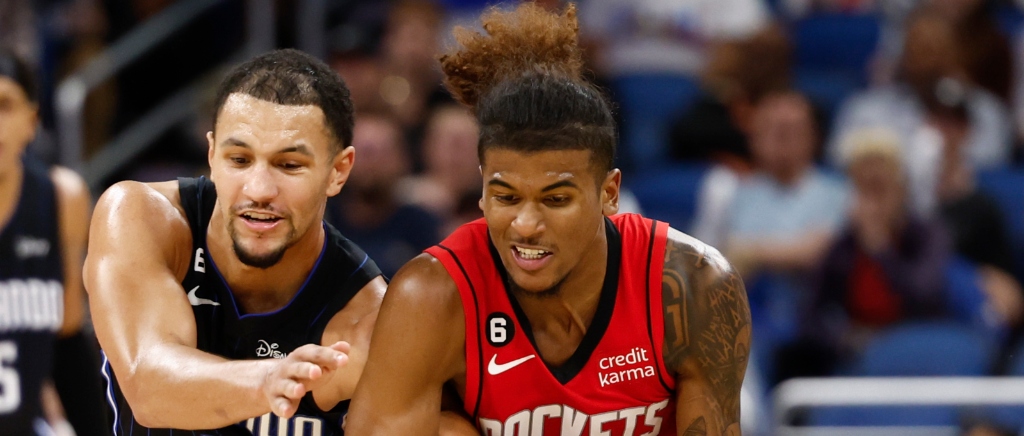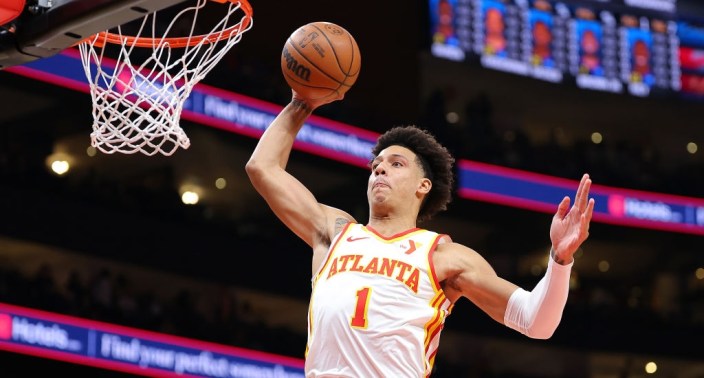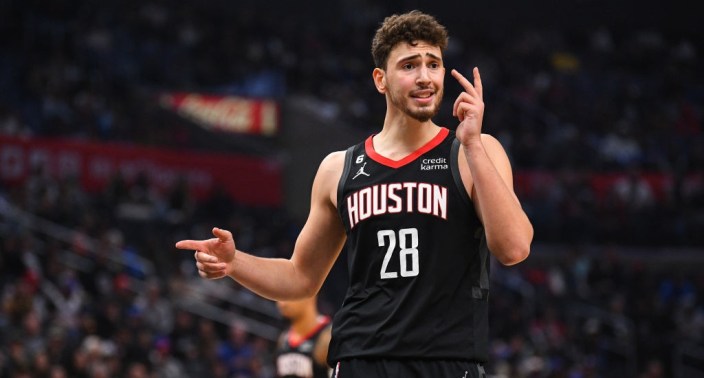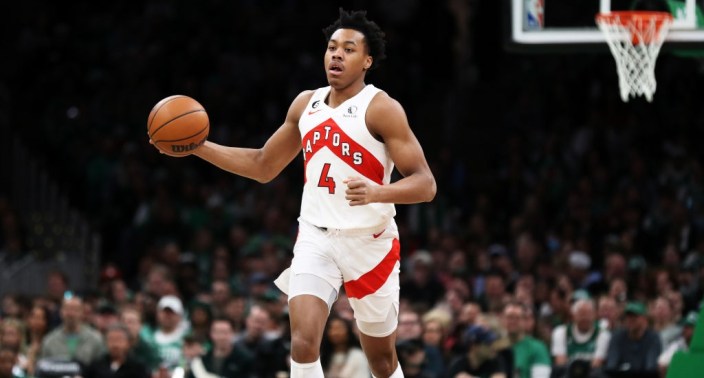
The deadline for teams to extend players drafted in the class of 2021 came and went on Monday evening at 6 p.m. ET, with a handful of big names getting deals — and some others opting to play out the last year of their deal and try to make more money in restricted free agency next summer.
Here, we’re going to look at each of the extensions that got done before the deadline — including the three max deals from earlier this summer — and grade them out from a team perspective. From the player side, every single one of these guys just signed on for life-changing money and gained the kind of financial security most can only dream of, which is a win for anyone. While some could’ve possibly gotten more next summer, in the current NBA world where restricted free agents pretty regularly get squeezed and often are just back at the negotiating table with their current team, it’s hard to fault anyone for taking the guaranteed deal now, especially when you can lock in eight or nine-figures.
For the grades, we will take into account each team’s current situation, what committing that kind of money means to them in the short and long term, as well as what we think the likelihood is the player in question ends up out-performing the average output of players in that pay range at their position. We’ll go in order by contract amount, from least to most, starting with the Mavericks and Jaden Hardy.
Dallas Mavericks — B: Jaden Hardy (3 years, $18 million)
This is a pretty low-risk move from the Mavs to keep around a guy with some real offensive upside. Any team in the title contender needs guys in this price range who can provide depth and even if Hardy stagnates some, this is a perfectly fine deal for a down the bench scorer. If he continues to develop and can take on a more regular role, this is a steal, but that’ll come down to whether he can pick it up on the defensive end, which is certainly not a guarantee.
Golden State Warriors — B: Moses Moody (3 years, $39 million)

I think, value-wise, this could be really good for Moody. I just don’t know whether the Warriors are the team that’s going to give him the opportunity to maximize his potential as a 3-and-D wing. He’s a good defender and has been consistently a league-average shooter, and guys of that archetype are pretty helpful. At $13 million per year, he’s right in line with what a solid 3-and-D guy makes (think, Dorian Finney-Smith), I just wonder if the Warriors will finally utilize Moody enough to get the value out of this deal.
Washington Wizards — B: Corey Kispert (4 years, $54 million)
Kispert’s deal is very close in terms of AAV to Moody’s, just with the extra year, and I think it was a very solid deal for the Wizards. Again, the question is whether this Wizards team is the one that can get the most out of Kispert, who seems best served as a connective piece on a good team and the Wizards, right now, are not that. However, if the goal is to get to being a playoff contender again, a guy who is 6’7 and can shoot at a near 40 percent clip from three is good to have. Beyond that, teams are always looking for wings that can shoot and this deal shouldn’t be hard to move for decent return if the Wizards end up deciding in a couple years they need more time and he’s not going to fit their timeline anymore.
New Orleans Pelicans — A: Trey Murphy III (4 years, $112 million)
I will admit that I’m probably higher on Trey Murphy’s upside than the consensus, but I think he’s an All-Star caliber player that they just locked up for $28 million per year. That’s the going rate for an Andrew Wiggins-type player, and I think he might already be that level of player with room to be even more in an expanded role. Now, the question is how quickly the Pelicans can create that role for him, as he’s still stuck behind Brandon Ingram, but there is, in my opinion, All-Star upside that could make this an incredible bargain for a guy who shoots it at a tremendous clip and is a high-level defender.
Houston Rockets — C-: Jalen Green (3 years, $106 million)
Before Rockets fans or Jalen Green fans get mad at me, this is not me saying Green cannot become the type of player that makes this contract look like a value. The issue is, with a third-year player option, there’s not a lot of upside for the Rockets with this deal. The best-case scenario is that Green is fantastic and blossoms into a consistently great scorer, but then it’s back to the negotiating table in 2027. If he stagnates, then he’s definitely picking up his $36 million player option for 2027-28, and he won’t be particularly tradable. I think Green and his agents did a great job with this deal, as he has the control on this contract while still getting financial security if his development stalls, and the team just doesn’t get much in the way of value on placing a bet that he takes a leap.
Atlanta Hawks — A-: Jalen Johnson (5 years, $150 million)

This isn’t a deal without risk, but there’s a real chance this ends up being the best value of any of these extensions. Johnson’s history of ankle injuries is certainly a bit concerning, and he’ll need to be able to be on the floor consistently throughout the life of this deal for it to be the home run the Hawks hope it can be. That said, this is a guy that averaged 16 points and 8.7 rebounds per game a year ago and figures to be Atlanta’s second option this season. The opportunity will be there for Johnson to flourish this year (there’s a reason he’s high up the MIP odds list), and if the shooting improvement from last year is real, he could be the budding star on the wing Atlanta’s been desperately trying to find alongside Trae Young.
Orlando Magic — B-: Jalen Suggs (5 years, $150.5 million)
If the shooting from last year (39.7 percent from three) is real, this is a phenomenal deal. If he takes a step back in that regard, then the Magic certainly took on some risk here. Suggs is a sensational point of attack defender and given the Magic want to hang their hat on that end of the floor, I understand why they want to lock up a guy that made the All-Defensive team last year long-term. What I’m interested in is whether there are strides coming for Suggs as a playmaker and facilitator, because this is the going rate contract for a league-average starting point guard in the NBA right now (see: Immanuel Quickley). Orlando is a unique situation with Paolo Banchero and Franz Wagner as high-usage, on-ball wings, but for this kind of money, they’ll want Suggs to be able to run the show a bit more and get everyone involved.
Houston Rockets — A: Alperen Sengun (5 years, $185 million)

Sengun might just be a monster. He averaged 21.1 points, 9.3 rebounds, and 5.0 assists a year ago before his season ended a bit early due to injury, and just keeps getting better as an offensive hub. Getting a guy who has already shown that level of production locked in for under the rookie scale max is very good work by Houston. The main question here is whether you can build around Sengun and Green together, and the Rockets are seemingly committed to that duo for at least a bit longer as the hopeful foundation of this team. Still, Sengun is a guy that very well could have commanded a max deal next summer with another really strong season, and to get him for $40 million less than that is a win for the Rockets.
Detroit Pistons — B+: Cade Cunningham (5 years, $224 million)
I still believe in Cade Cunningham as an All-Star caliber guy, even if they hype around him going into the 2021 Draft was perhaps overstated. The truth is, a No. 1 overall pick has to be pretty underwhelming to not get a rookie scale max extension — the last one not to was Deandre Ayton, who got a max offer sheet from the Pacers instead (which Phoenix matched). Cunningham averaged 22 points and 7.5 assists per game last season on career-best shooting, and did so with a roster around him that was far from ideal. There’s always some risk with this kind of money and Cunningham hasn’t been at that hyper-elite level just yet to make you feel this is a guaranteed good deal for Detroit, but overall this was a deal Detroit had to give out and keep up hope that the best is yet to come for Cade (and the Pistons).
Orlando Magic — B-: Franz Wagner (5 years, $224 million)
I really like Franz Wagner as a player, but I’m not sure the Magic had to give him a max deal this summer. There wouldn’t have been much downside to playing out the year and just confirming that the perimeter shooting would bounce back, and I’m just not sure he’s at the level where you absolutely had to give him this kind of commitment early. That said, there is a clear path to him being more than worth it as the second star alongside Paolo Banchero, particularly if he returns to being a league-average three-point shooter to go along with his leap as a finisher at the rim and in the midrange. It certainly wasn’t a disaster for Orlando to give him this deal, but with this and the Suggs contract, the Magic are going to be beholden to internal development to push them to the next level in the East.
Toronto Raptors — A-: Scottie Barnes (5 years, $224 million)

This was a no-brainer for the Raptors, as Barnes was the Rookie of the Year winner in 2022 and took another step forward in his third season, earning an All-Star nod, averaging 19.9 points, 8.2 rebounds, and 6.1 assists per game. Given that early success, they traded Pascal Siakam and OG Anunoby to clear their cluttered (but talented) wing rotation and give Barnes the keys to the operation. I will say that I am not completely sold on Barnes being the centerpiece you build everything around, but even with my skepticism on that front, this is just a deal you have to make at this point. He’s improved as a playmaker and the next step is combining that with another leap in terms of shooting efficiency, but the vision for Barnes is clear. The truth is, even if he doesn’t reach his full potential, and is just perennially in the All-Star mix and not a No. 1 on a contender, this is still a deal you give him — it’s the next contract that gets much trickier.
